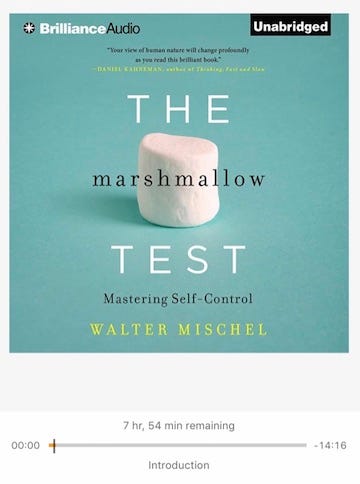The Marshmallow Test by Walter Mischel

This book always intrigued me. Studying human nature, decision-making, and influence are all things I enjoy. This book took a look at a few of those but focused on willpower. How does willpower change over time and can we delay gratification? Sometimes, but not all the time.
Is this surprising to you? It was not surprising to me, though not something I have spent much time thinking about. We always want the real thing. If we think about something as if it were real, that usually leads us to believe we can have it — which isn’t always true.
When people pretended the real items were just pictures, they waited much longer than when they saw a picture and imagined it as real.
Wow. Even mild and acute stress? Controlled stress is fine but it’s the uncontrolled stress we need to be wary of. Prefrontal cognitive abilities are responsible for things from The prefrontal cortex is an important part of the brain that is responsible for many of our cognitive abilities. The prefrontal cortex is required for our analytical thinking (problem-solving), emotional control and intelligence, verbal communication, and memory forming abilities. The loss of them, especially a dramatic one, could be detrimental.
Amy Arnsten of Yale University concludes: even mild and acute uncontrolled stress can cause a dramatic loss of prefrontal cognitive abilities.
If we focus on this, we are likely able to become very aware of situations when our inhibitory response is not what we’d like it to be. Immediate temptations are what the devil uses to tempt us all. Eve took a bite out of the forbidden fruit because the serpent led her to believe she would be like God. Little did she know, God had created a paradise for her and Adam.
Resisting powerful and immediate temptations and seductions for the sake of more important delayed outcomes — think of an inhibitory response when temptations or seductions arise. Implementation of if then plans that center around action.
I love this analogy. Donald Head makes a very important point here and I think it’s essential to remind ourselves it is not just black or what. It is nature or nurture, but it is both. Anyone who says it is entirely nurture forgets that we were developing in a womb for 9 months. Anyone who says it is entirely nature that the prefrontal-frontal cortex does not fully develop for over 15 years during which time we are exposed to a variety of environments, circumstances, and people.

Nature and nurture are both important, who we are and what we become has a great amount of interplay. As Canadian psychologist Donald Head noted, it is like asking what’s the more important determinant of a rectangle’s size, its length or its width.
Everything is contextual. Maybe we are not always aware but the way we would express aggression to a child is entirely different (I hope) from the way that would be expressed to an adult. All things are based on those around us, start paying attention and I assure you, you’ll see for yourself.
What people really do is contextual:
When people display: conscientious, honesty, aggression, and sociability it’s all contextual
This has been shared time and time again yet… this is not applied at a wide level throughout many parent-child relationships. It is essential that we model through actions. Children copy. If you say one thing and do another, children will see right through that and follow our actions rather than our words.
If you want to have children that adopt high self-reward standards, it’s a good idea to guide them to adopt those standards and also model them in your own behavior. If you aren’t consistent and are tough on your children but lenient on yourself, there’s a good chance they’ll adopt the self-reward standard that you modeled not the ones that you imposed on them.
How many people reading this were already aware that angry voices while a child is sleeping can increase the stress reactions in a child’s brain? I knew some of the things that our mind does while we sleep and such but did not understand or fully grasp the extent of it. The solution though, seems so obvious, doesn’t it? If we want the children we are raising to have low levels of stress in their first years, we need to reduce our own stress.
Children who live with seemingly mild chronic stressors in their first years of life like persistent albeit nonviolent parental conflict may experience increased stress reactions in their brain. Simply hearing angry voices while sleeping classify as this.
To keep stress levels for infants low, parents should seek to reduce their own stress.
God created us all to be unique, one of a kind, and incredibly powerful. Also, we can, and should, continue to grow each and every day of our blessed lives. There are things within us that we can alleviate, things we can improve, and things we can decide to simply change.
It’s been said, “I think therefore I am.” now, we know we can say, “I think therefore I can change what I am.”
We can change what we feel, do, and become.
At the end of the book, the author shared a practice that psychologist George Kelly used. He simply responded to his clients in the most assertive way possible. He put them in the driver’s seat of their destiny. If there is something that you are seeking to change, don’t ask someone else to do it for you. If there is something that you are seeking to change, ask yourself and respond honestly to the question below.
George Kelly said to his therapy clients when they kept asking if they could get control of their lives, he looked straight into their eyes and said, “would you like to?”

I enjoyed this book and learned a few things. The most important takeaway for me was the truth that we act differently in situations and around people and we truly have control. There is nothing that we do not have control over. God blessed us with free will and while He will soften our hearts if need be or speak to us, we need to seek Him first. God can do anything, move mountains, and make great changes. It is up to us to WANT to change and then to actually do so. Because we think, we can change. We are known to change over time anyway so why not be aware of how we are changing and direct it ourselves? There is no reason. We just need to want to change in the way that we would like and then we must actually act and do it.
I gave this book a 3.5/5